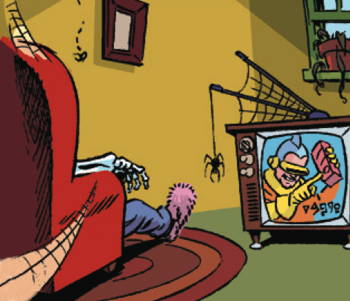October 2021
October 11, 2021
Miss Kickback
At the end of each year, South Carolina would reward "kickbacks" of surplus state funds to the counties. In honor of this annual event, in 1962 and '63 the Columbia, SC Chamber of Commerce decided to hold a "Miss Kickback" beauty contest.The winner for 1962 was Jayne Arnold, and in 1963 Ann Warr was awarded the title.
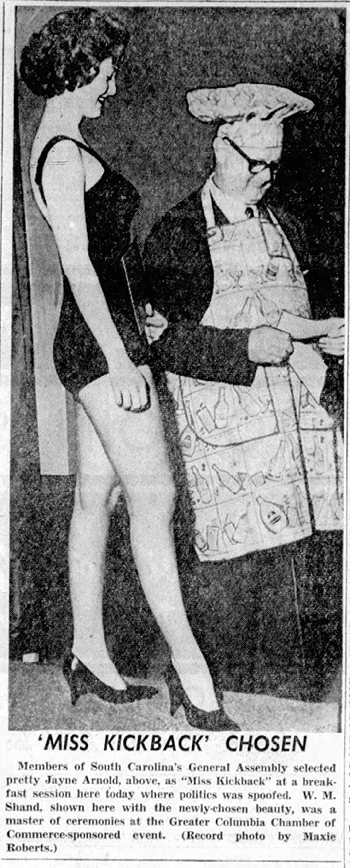
The Columbia Record - Jan 10, 1962


The Columbia Record - Jan 9, 1963
Posted By: Alex - Mon Oct 11, 2021 -
Comments (1)
Category: Awards, Prizes, Competitions and Contests, Politics, 1960s
The Great Cardini
Man, that's a lot of playing cards and cigarettes!His Wikipedia page.
Posted By: Paul - Mon Oct 11, 2021 -
Comments (0)
Category: Entertainment, Magic and Illusions and Sleight of Hand, Tobacco and Smoking, Twentieth Century
October 10, 2021
A Moose for Jessica
In 1987, a wild moose fell in love with what zoologists refer to as a "biologically inappropriate object". His love interest was a cow named Jessica who lived on the Vermont farm of Larry Carrara.For over two months the moose displayed courtship behavior towards Jessica. He followed her all around, would rest his head on her back, or would push hay toward her as a food offering.

The moose and Jessica
Over 75,000 sightseers came out to Carrara's farm to witness this interspecies romance.
Finally, after 76 days, rutting season came to an end and the moose lost interest in Jessica and wandered back into the wild.
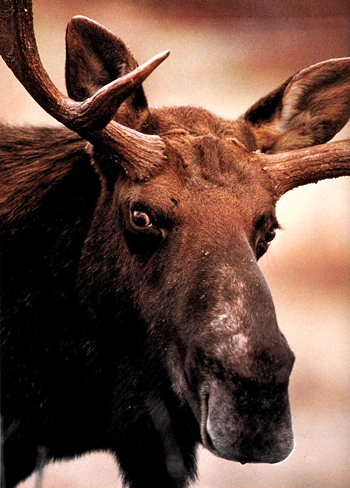
The moose
The romance between the moose and Jessica inspired the book A Moose for Jessica, written by Pat Wakefield with photographs by Larry Carrara. It's available on Amazon, or you can read it for free at archive.org.
More info: wikipedia, New England Living
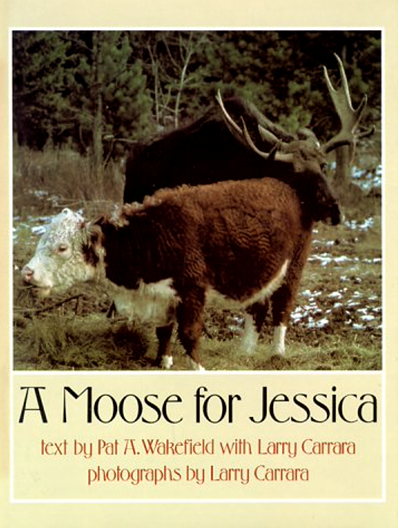
Posted By: Alex - Sun Oct 10, 2021 -
Comments (0)
Category: Animals, Cows, Books, 1980s, Love & Romance
Miss Albinism of Kenya, 2018
BBC coverage here.
I cannot find any evidence that the contest continued in subsequent years.
Posted By: Paul - Sun Oct 10, 2021 -
Comments (0)
Category: Awards, Prizes, Competitions and Contests, Beauty, Ugliness and Other Aesthetic Issues, Human Marvels, Africa
October 9, 2021
No dates for speeders
If Aristophanes's Lysistrata was rewritten to be set in Memphis during the 1930s, it could be about all the young women banding together to refuse to date any boys who drove faster than the speed limit.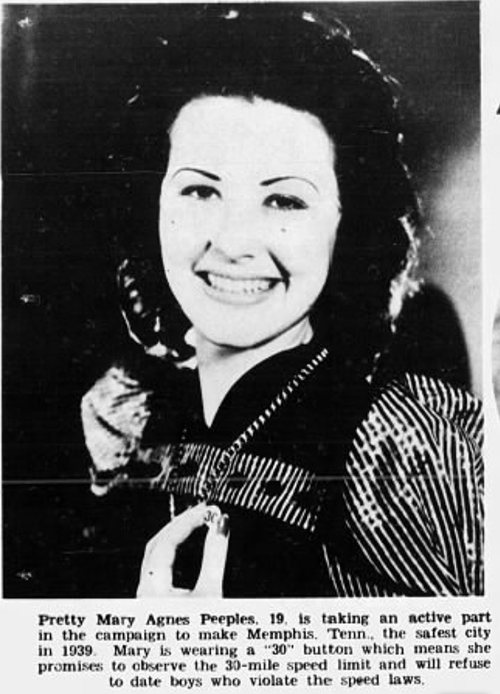
Pittsburgh Press - Feb 26, 1939
A better quality picture of Mary Agnes:
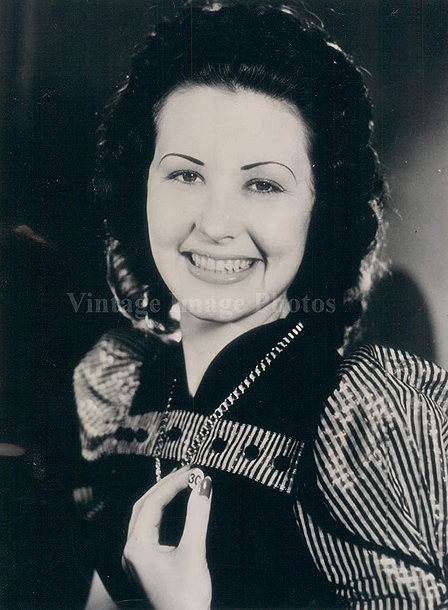
Posted By: Alex - Sat Oct 09, 2021 -
Comments (2)
Category: Gender, 1930s, Cars
And the Villain Still Pursued Her; Or, The Writer’s Dream (1906)
The movie in questions starts at minute 32:00.
Essay about it here.
And the Villain Still Pursued Her; Or, The Writer’s Dream joins that rarified company of “What in the name of heaven did I just watch?” films.
Posted By: Paul - Sat Oct 09, 2021 -
Comments (2)
Category: Dreams and Nightmares, Movies, Surrealism, Writers, 1900s
October 8, 2021
Crook, the Unkissed
Algie R. Crook (or "Alja" Crook, as his name was sometimes spelled) was a professor of mineralogy at Chicago's Northwestern University. His great claim to fame, however, had nothing to do with science. Instead, it was that in April, 1901 he allegedly told his undergraduate class that he had never kissed a woman. More specifically, he reportedly said, "I have never uttered a profane word, never have smoked or chewed tobacco, drank intoxicants, nor hugged or kissed a woman."Given that he was thirty-seven years old at the time, this was considered a remarkable admission. So remarkable that when word of it leaked to the press it became international news.

Great Falls Tribune - May 15, 1901
The media started referring to him as "Crook, The Unkissed." Acquaintances of Crook (or people who claimed to be his acquaintances) readily confirmed the tale, attributing his lack of kisses to his embrace of "austere science." One said, "the scientific atmosphere is inimical to the love germ."
Offers of marriage flooded in, from women hoping to be the one to thaw the professor's icy reserve.

Philadelphia Times - Apr 28, 1901
The French were particularly taken with the story. As reported in the Leavenworth Times (May 8, 1901):
Supposedly the news even reached as far as China where the dowager empress expressed a desire to see him.

Philadelphia Inquirer - Apr 27, 1901
Crook, for his part, was said to be "abashed and humiliated over the gossip the affair has provoked," and also furious at the "tattling undergraduates."
He issued a denial of the allegation, stating, "I have never told any one that I have refrained from hugging or kissing women, for the reason that I consider it nobody's business but my own."
He recalled having advised a student to do as he did — never to kiss, hug, swear, and so forth. And he figured that's how the story must have started. But he insisted that he hadn't said that he had never done these things at all.
However, it was too late. The story was out there and couldn't be taken back. His denial got buried in the back pages of newspapers, if it was printed at all.
In other interviews, Crook asserted that he had kissed female family members, which didn't help his case much since it implied that he had indeed never romantically kissed a woman. Also, a former student recalled that Crook had made similar claims before, noting, "He is a consistent Methodist, and his convictions sometimes cause him some trouble." So I kind of suspect that Crook really did make the no-kissing claim to his class, but denied it later out of embarrassment.
Whatever the case may have been, the tale continued to haunt him. The following year (1902) a group of students at Northwestern formed an "Anti-osculation Society," claiming that they were "following the teachings of Professor Algie R. Crook, the man who never was kissed." They elected him an honorary member.
In 1904 Crook got married, and inevitably this triggered a renewal of the no-kissing story. "Unkissed Man To Wed," reported the papers.

The Hutchinson News - Dec 28, 1904
Crook and his wife eventually had five children together. He died in 1930, at the age of sixty-six, and the kissing story resurfaced in his Chicago Tribune obituary (June 1, 1930). It was, after all, the achievement he was most famous for:
However, the memorial of him in the Journal of the Mineralogical Society of America omitted the kissing story. Nor is it mentioned on the wikipedia page about him.
Posted By: Alex - Fri Oct 08, 2021 -
Comments (6)
Category: Eccentrics, Science, 1900s, Love & Romance
Scott Perky’s Bi-Directional Text
Henry Perky invented shredded wheat. His son, Scott, was also an inventor, though not as famous. He invented and patented a bi-directional, symmetrical font which could be read from left-to-right or right-to-left.
Perky's idea was that this would allow one to read a line of text from left to right, and then read the next line right to left, without having to move the eye back to the beginning of the line. This, he claimed, would reduce "brain fag":
It is hardly necessary to allude to the strain upon the eyes and brain, which results from much reading. To students, researchers and others whose lives are cast among books, any device which promises to facilitate reading in such wise as to lessen fatigue of the optical tract, and consequent headache and brain fag, will appear of unusual importance.
Randy Ludacer of Beach Packaging Design took the time to set the first three lines of Perky's patent in the bi-directional font, so you can experience what it would be like to read it:

Posted By: Alex - Fri Oct 08, 2021 -
Comments (5)
Category: Inventions, Patents, Languages, 1900s
The Arctic Venus
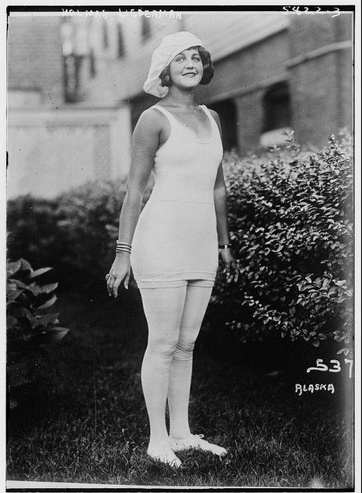
Helmar Leiderman was the first Miss Alaska. Not really one of of our "oddball beauty titles." Except that when she was disqualified on a technicality during the Miss America contest, she sued and was later arrested.
Article source: The San Francisco Examiner (San Francisco, California) 01 Nov 1925, Sun Page 140
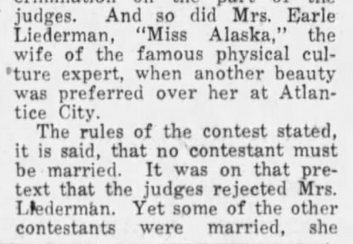
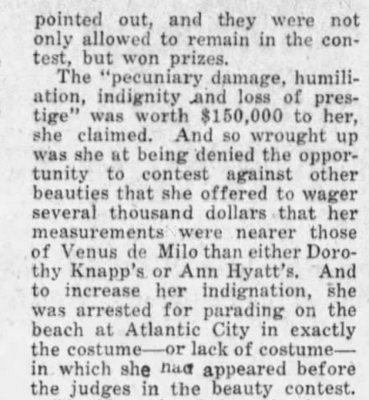
Posted By: Paul - Fri Oct 08, 2021 -
Comments (0)
Category: Awards, Prizes, Competitions and Contests, Beauty, Ugliness and Other Aesthetic Issues, Lawsuits, 1920s
October 7, 2021
Trapeze Artist Swallows Watch
"About a week ago Miss Nichols missed her watch. Since she occasionally places valuables in her mouth at night for safe keeping, she feared she might have swallowed the timepiece."I'm sure Miss Tarzana Nichols really went to the hospital, but I'd be willing to bet that the reason she went was just a stunt to get her name in the papers. Free publicity for her act.

Kansas City Star - Oct 11, 1934
Posted By: Alex - Thu Oct 07, 2021 -
Comments (4)
Category: Publicity Stunts, 1930s
| Get WU Posts by Email | |
|---|---|

| Who We Are |
|---|
| Alex Boese Alex is the creator and curator of the Museum of Hoaxes. He's also the author of various weird, non-fiction books such as Elephants on Acid. Paul Di Filippo Paul has been paid to put weird ideas into fictional form for over thirty years, in his career as a noted science fiction writer. He has recently begun blogging on many curious topics with three fellow writers at The Inferior 4+1. Chuck Shepherd Chuck is the purveyor of News of the Weird, the syndicated column which for decades has set the gold-standard for reporting on oddities and the bizarre. Our banner was drawn by the legendary underground cartoonist Rick Altergott. Contact Us |
